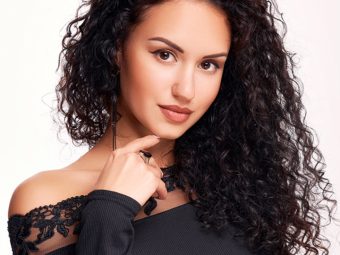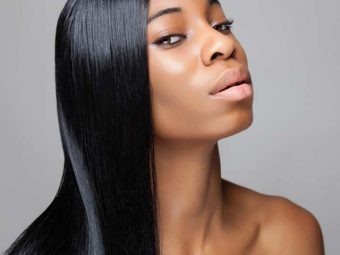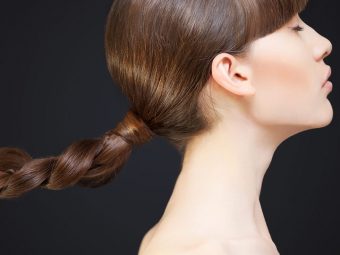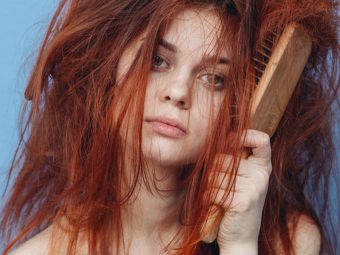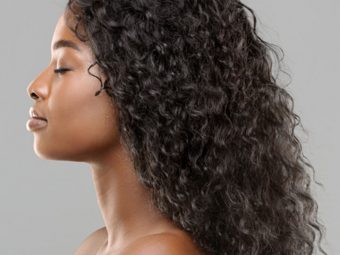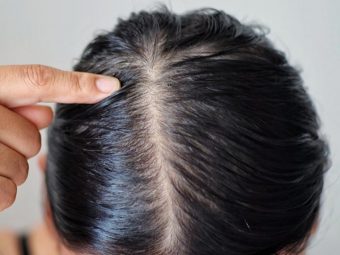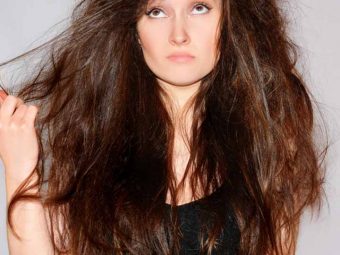Simple Ways To Use Tea Tree Oil For Dandruff
Easy and safe ways to use this essential oil to keep your scalp flake-free and healthy.
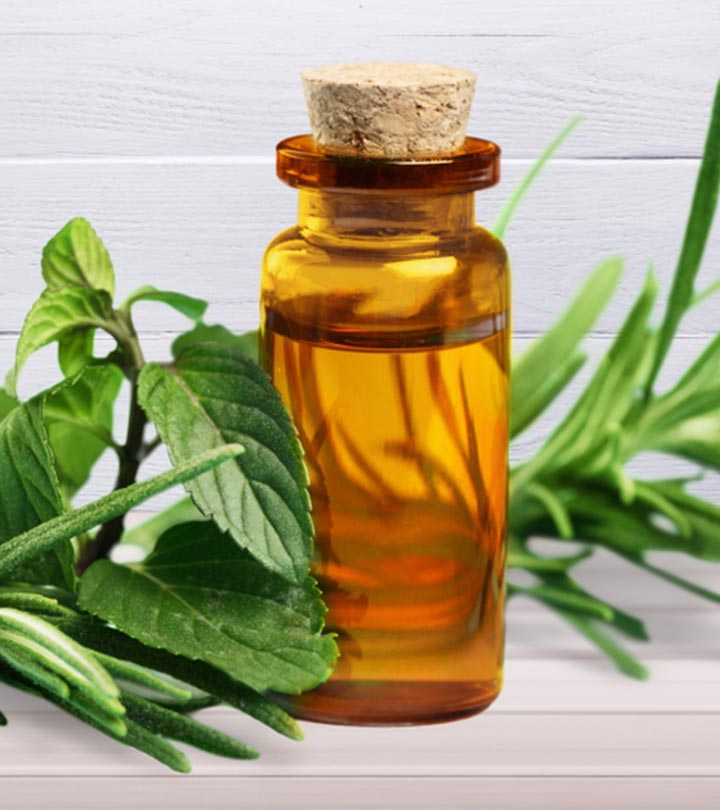
Using tea tree oil for dandruff has been proven to offer visible results. Many hair care products like shampoos, lotions, shower gels, and massage oils use tea tree oil for the array of benefits it offers. This oil is made by steam distillation of the leaves of Melaleuca alternifolia, a plant native to Australia. The concentrations of tea tree oil vary and are used for different purposes. Tea tree oil is an effective remedy for insect bites, minor cuts, nail fungus, acne, and to some extent, it treats dry and dull skin. It may also help manage Athlete’s foot. Read on to know how tea tree oil may manage dandruff.
In This Article
Benefits Of Tea Tree Oil For Dandruff
It is generally believed that tea tree oil can help treat dandruff. Here are its top two scientifically-backed benefits in this regard:
1. Helps Reduce The Growth Of Mallesezia On The Scalp
Malassezia is a fungus that lives on everyone’s scalp, albeit in small quantities. However, in some cases, this fungus can grow uncontrollably. This can happen due to poor hygiene habits – such as not shampooing regularly – or if you have an underlying medical condition.
According to a study conducted at the Royal Prince Alfred Hospital (Australia), using a shampoo with 5% tea tree oil is effective for treating dandruff. The study further suggests that tea tree oil shampoo users demonstrated a 41% reduction in dandruff severity as opposed to the ones on the placebo (1).
Since tea tree oil is quite potent, you will need to mix it with a carrier oil – like coconut, olive, or almond oil – before applying it to your hair.
2. Reduces Dandruff-Related Symptoms
Anecdotal evidence suggests that tea tree oil can reduce the itchiness, greasiness, and lesions that come with the onset of dandruff. It is said to moisturize your scalp, eliminate toxins, and improve blood flow. Moreover, it may provide your scalp all the essential nutrients to prevent hair fall, another side-effect of dandruff. However, there is no scientific evidence that proves these claims.
To alleviate these symptoms, you can try a tea tree oil hair mask for dandruff. You can use avocado paste and yogurt as a base and add honey along with a few drops of tea tree oil. Apply this mask and massage your scalp in gentle strokes. Rinse it off after 15-20 minutes.
Aside from using tea tree oil for dandruff and hair loss, you can also apply it to get rid of head lice. A study noted a 100% mortality rate against head lice after applying a 1% concentration of tea tree oil for 30 minutes (2).
Note: Keep in mind to use tea tree oil for head lice in kids only after consulting a doctor.
Now that you know all about the benefits of tea tree oil for treating dandruff, let’s check out how to use it.
How To Use Tea Tree Oil For Dandruff?
Tea tree oil is one of the most effective essential oils when it comes to treating dandruff. If you are keen on knowing how to use tea tree oil to remove dandruff, here’s a list of its wide-ranging applications:
- Use a ready-made shampoo that already contains 5% tea tree oil.
- If your preferred shampoo does not list tea tree oil as an ingredient, you can add 5-10 drops of the oil to the bottle yourself. Make sure to shake the bottle well. Then, simply massage this mixture into your scalp in circular motions and wash it off with cold water.
Make your own DIY tea tree oil shampoo for dandruff. For this, you will need 1/2 teaspoon virgin cold-pressed coconut oil/oilve oil, 2/3 cups of baking soda, 1/4 cup of filtered water, 1/2 teaspoon vitamin E oil, 1/8 cup of coconut milk, and 20 drops of tea tree oil. Mix all ingredients in a glass jar, shake vigorously, and use a teaspoon of the mixture each time you wash your hair.
Precaution: Avoid using tea tree oil if you have eczema.
You can store this shampoo for up to a month. Just remember to shake the jar well before use. Also, make sure to use the tea tree oil shampoo for at least four weeks to treat dandruff effectively.
Though tea tree oil is an effective treatment for dandruff, it can cause certain side effects. Find out more in the next section.
Side Effects And Risks Of Using Tea Tree Oil
Although tea tree oil can help with dandruff, its use comes with a set of precautionary measures. Additionally, remember the following pointers:
- Toxic If Swallowed: The National Capital Poison Center claims that tea tree oil can be poisonous if swallowed (3). Hence, avoid using it anywhere near the mouth. Its oral consumption can also cause serious symptoms like confusion, loss of consciousness, and ataxia (loss of muscle coordination).
- Can Cause Irritation/Redness In The Eyes: Take care when using tea tree oil on your scalp to not let it run into your eyes. In case it enters your eyes, make sure to splash warm water and flush it out. If your eye becomes red or irritated, call your doctor immediately.
- Can Cause Skin Irritation Or Scalp Itching: As a thumb rule, avoid using concentrated tea tree oil directly on your skin/scalp as it can lead to irritation/itching.
- Can Cause Unknown Allergic Reactions: According to an Australian study, the prevalence of tea tree oil allergy is 1.8% (4). Doing a patch test before using the essential oil on your scalp is a must as you may develop contact dermatitis, an allergic skin rash.
Other rare but notable side effects of tea tree oil include:
- Stinging
- Burning
- Scaling
- Dryness
When Should You See A Doctor?
Dandruff is not a medically serious condition. However, it may point to an underlying condition with similar symptoms. Either way, consult a doctor about your dandruff if:
- It does not go away with over-the-counter solutions like anti-dandruff shampoos.
- Shampooing often is not helping.
- The itching on your scalp is getting out of control and disrupting your daily life.
- Your scalp is red, swollen, or showing open sores.
Tea tree oil has been widely used over the years to naturally treat skin conditions like dandruff. If you are looking to cleanse your scalp without drying out or damaging your hair, tea tree oil is the way to go.
That said, this essential oil is potent and should be diluted before using. Before using tea tree oil for dandruff removal, do a patch test on a small area. Try these time-tested strategies and let your hair down!
Tea tree oil is a common ingredient in many hair and skin care products, thanks to its wide range of beneficial properties. It shows strong resistance against Malassezia fungus and tackles dandruff besides reducing related symptoms like scalp itchiness and greasiness. Use a shampoo containing tea tree oil to avail its benefits against dandruff. You can also add a few drops of the oil to the bottle itself. You can also prepare tea tree oil hair masks or shampoos at your home. However, do not use tea tree oil without diluting it, and do a patch test before using it on your hair to avoid adverse effects.
Frequently Asked Questions
Can I mix aloe vera and tea tree oil for dandruff?
Yes. You can mix 3-4 drops of tea tree essential oil in five tablespoons of aloe vera gel and apply it to your scalp. The soothing effect of aloe vera and tea tree oil’s anti-fungal and anti-bacterial properties may help relieve dandruff.
Does tea tree oil have other benefits for the scalp or hair?
Yes. Tea tree oil has antiseptic properties that help manage acne and fungal infections, soothe skin inflammation, and relieve psoriasis.
Key Takeaways
- Tea tree oil can limit the growth of Malassezia on your scalp.
- It can also help eliminate lice, but you should consult a doctor before using it on kids’ scalps.
- According to the National Capital Poison Center, one should not swallow tea tree oil as it can be poisonous.
Sources
- Treatment of Dandruff with 5% Tea Tree Oil Shampoo.
pubmed.ncbi.nlm.nih.gov/12451368/ - Activity of Tea Tree Oil and Nerolidol Alone or in Combination against Pediculus Capitis (Head Lice) and Its Eggs.
link.springer.com/article/10.1007/s00436-012-3045-0 - Tea Tree Oil:Remedy and Poison.
www.poison.org/articles/2010-dec/tea-tree-oil - Allergy to Tea Tree Oil: Retrospective Review of 41 Cases with Positive Patch Tests over 4.5 Years.
pubmed.ncbi.nlm.nih.gov/17535193/





